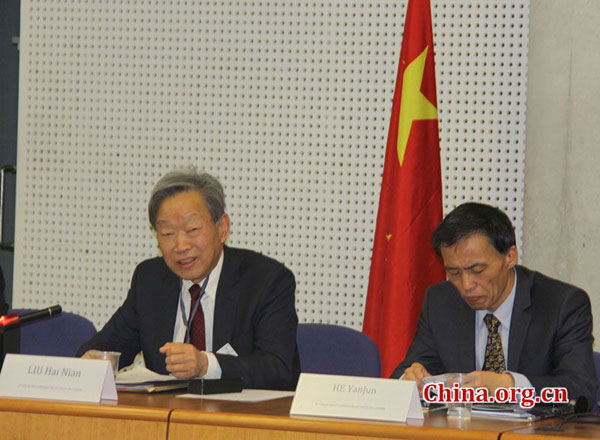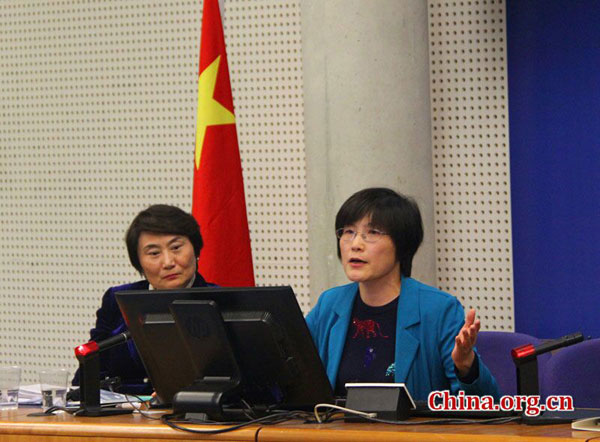China improves education for children
- By Zhang Rui
 0 Comment(s)
0 Comment(s) Print
Print E-mail China.org.cn, December 8, 2015
E-mail China.org.cn, December 8, 2015
Two experts elaborated on how China will improve and use child education to help protect minors' rights and interests, especially female children and ethnic minority groups, at the first Sino-European Forum on Human Rights held in Strasbourg, France on Friday.
|
|
| Professor Liu Hainian (L), director of the Center for Human Rights Studies at China's Academy of Social Sciences, speaks at the first Sino-European Forum on Human Rights held in Strasbourg, France on Dec. 4, 2015. [Photo by Zhang Rui/China.org.cn] |
Professor Liu Hainian, director of the Center for Human Rights Studies at China's Academy of Social Sciences, said China paid great attention to children's education as early as 1,000 years ago. However, during the previous century, China was left behind due to invasions and wars. When the People's Republic of China was founded in 1949, the illiteracy rate of the nation was a stunning 90 percent.
However, China has been improving education for decades. As nationally supported nine-year compulsory free education ends after junior high school, many students aged 15 abandon further studies due to financial or other reasons, creating a time gap for many of these underage children to be child laborers. "The good news is, China is going to promote a 12-year education system for minors during its 13th Five-Year Plan, " Liu said, "this can help prevent these problems."
Liu said that education will help children grow and maintain their interests and rights, helping to enhance the qualities of China's citizens which will also contribute to the progress of China and the world.
However, Cong Zhongxiao, director of the Family Education Research Center at the All-China Women's Federation, said there are still problems in remote rural areas. Aside from traditional inner-family discrimination against girls which remains in some areas, girls themselves sometimes voluntarily abandon education because of the pressure of finding employment after graduation. Many of these girls would love to work early.
|
|
| Cong Zhongxiao, director of the Family Education Research Center at All-China Women's Federation, speaks at the first Sino-European Forum on Human Rights held in Strasbourg, France on Dec. 4, 2015. [Photo by Zhang Rui/China.org.cn] |
Liu said that China's compulsory education policies have erased much of the discrimination against girls and many are now ensured education.
Cong shared that China has dispatched great funds to support all ethnic minority groups, such as Tibetans and Uygurs, to study in school up to the university level totally free of charges. China has also established special schools for the underprivileged and disabled children, making sure to enroll them into schools with care.
Liu added that China has 56 ethnic groups and that every ethnic group now has university students. The ethnic minority groups can enjoy more benefits including lower scores, in comparison to Han people when seeking entry into universities for further education. Their status is even better than some cases in Europe, as some races in European countries still never have the chance to enroll in university.
"China is trying very hard to implement education equality between Han Chinese and other ethnic minority groups, as well as between girls and boys," Liu said. Cong added that ethnic minority language education was also added to classes in addition to Mandarin and English to help the ethnic minority groups maintain their own culture.
Chinese and European scholars together with judges exchanged views and shared respective statistics from both sides on various issues ranging from the illegal use of child labor, child trafficking, child pornography, child prostitution, juvenile crimes and court systems to education for children.
The forum was jointly held by the European Court of Human Rights, the University of Strasbourg, China’s Society for Human Rights Studies and the International Institute of Human Rights.








Go to Forum >>0 Comment(s)